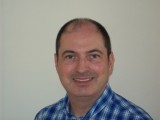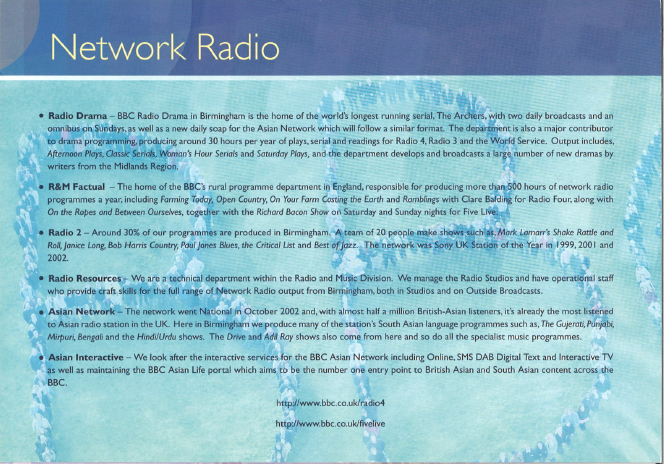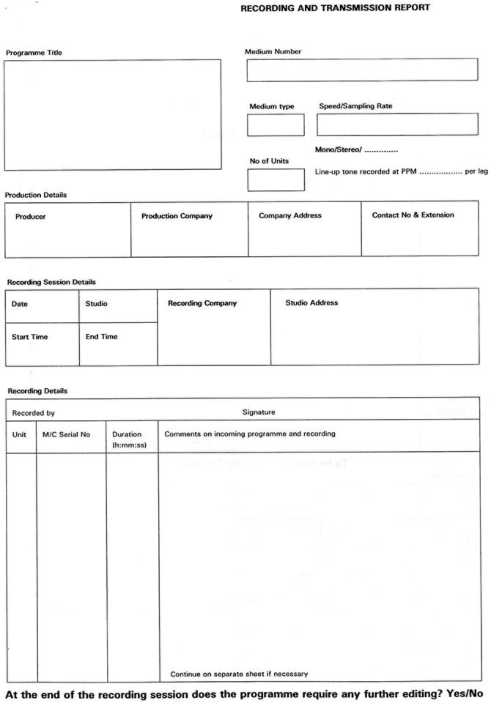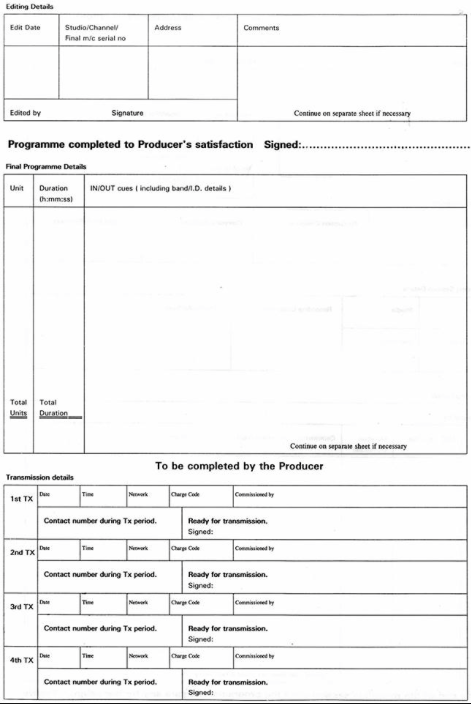
left to right: Clive Payne (presenter), Ian Wood (main presenter and producer), front Nermin Aaron (presenter), right Paul Flower (presenter)
I presented for Radio WM of a weekend between 1989 and 2000. I also did some bits for television too but predominantly, my time was spent in radio.
I co-presented a Sunday night locally networked programme called the Sunday Night Party and it’s main presenter, Ian Wood, would occasionally allow me to go off and interview people, some of them famous, for the programme.
For those people who remember the configuration of Radio WM’s studios, they were basically five cubicles or ‘Areas’ as they were locally known. Areas One and Two were self-op studios, Area Three, although designed as a studio but without self-op desk was used as the telephone answering area. Area Four was the same as one and two and Area Five was set up with a round discussion table and a number of mic sources, which were controlled as ‘slaves’ from Area four.
The Sunday Night Party was transmitted live from Area Five because of the number of contributors participating in each programme and driven by me, also presenting from Area Four. It was taken by WM, Hereford and Worcester, Shropshire and Stoke and in the earlier years Coventry and Warwickshire had us too, all under the local branding of ‘Midlands BBC’. WM’s jingles were re-sung to reflect this.
On one occasion I became aware of a new band gigging in Birmingham and the SNP was a good platform to promote local talent. I invited the band, whose name I can’t remember now, into the studios to record a couple of songs for the SNP early one evening. I duly ordered up some extension leads and extra mics from Paul Hunt our engineer in charge and some acoustic screens too, to ‘encase’ the drummer in so the sound didn’t spill.
We cleared the furniture in Area five and prepared for a sound check. I’m not saying they were loud but I’ve never seen PPM meters on a Mark 3 desk wrap themselves around the stop quite so quick! Oddly enough the floor seemed to vibrate too.
The evening continued and we were about ready to record the two songs after I’d interviewed the band.
Radio WM provided locally networked programmes during the week too and ready to go out live in Area two was Tony Wadsworth and Julie Mayer.
The band started to play and rocked the first floor. I heard that Tony and Julie had to apologise to their listeners as the sound of the band could be heard in their studio and therefore by their listeners.
Radio WM’s studios were above the Daytime Live offices downstairs. Unbeknown to me, there were a couple of people working late in there that evening and they could feel the ceiling vibrate from the sound of the drums from the band immediately above their heads. Rumour had it that a diffuser shade came loose off a light fitting in their office as a result of the vibration.
I never got to apologise for disturbing their evening so if they know who they are then perhaps this can go some way to being a belated apology.
As this was a one off band session, I did ask WM management if I could hire Studio 2 in Network Radio as this would have been easier but WM were unwilling to spend that kind of money in those days. I therefore had to resort to the cheap option.
So that was the one and only time I made the earth vibrate for various people in Pebble Mill.
 Clive Payne
Clive Payne
The following comments were left on the Pebble Mill Facebook page:
Andy Walters: ‘Area 1 was Asian Network, Area 2 was the self op one that looked into Area 3, Phone in room. Area 4 was the other self op cubicle that could also drive the mics in Area 5 which was just a talks studio. Apparently Area 1 was the Editor’s office in the days of BBC Mk2 desks and the third studio was sat next to the record library.
I remember the night of the earthquake well which disrupted WM’s programmes as well as Edwina Currie on Radio 5 Live.’
Tony Wadsworth: ‘If I recall the studio configurations correctly, area one wasn’t a self-op studio. I presented the breakfast show from there 94/95 and Chris Christopher Baxter drove me from area two. And the late show came from area four….I think!’
Ian Wood: ‘So that was what went on when I was elsewhere! Sorry about that, Daytime Live office. And hats off to Clive for the blog and the photo.’
 Copyright resides with the original holder, no reproduction without permission.
Copyright resides with the original holder, no reproduction without permission.


